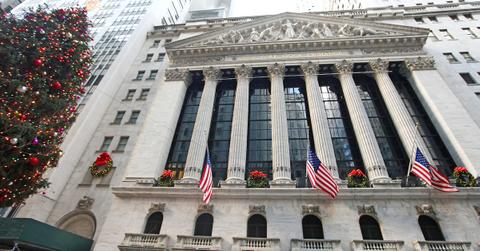What Happens if the Stock Market Is Closed?
The stock market will be closed on Thanksgiving. Here's what happens with pre-market and after-hours sessions over a holiday.
Nov. 24 2020, Updated 10:15 a.m. ET

With the holiday weekend approaching, you may be aware that the stock market is closed completely for Thanksgiving Day. In addition, the markets will operate on a shortened schedule on Black Friday (Nov. 27) and will only be open from 9:30 a.m. until 1:00 p.m. ET.
There are only a handful of days throughout any given year when both the NYSE and Nasdaq trading exchanges are closed for trading. Generally, the market is not closed for longer than three consecutive days. When the stock market is closed, there are some options for investors to continue trading.

On what days is the stock market closed?
Nine official holidays are observed for the U.S. stock market. On those days when the stock market is closed, investors cannot place orders to buy or sell securities on either the NYSE or the Nasdaq. Thanksgiving and Christmas Day are the two stock market holidays remaining in 2020.
Here’s the complete list of days when the stock market is closed each year:
- New Year's Day (Jan. 1)
- Martin Luther King, Jr. Day (third Monday in January)
- President's Day, or Washington's Birthday (third Monday in February)
- Good Friday (varies by calendar year)
- Memorial Day (last Monday in May)
- Independence Day (July 4)
- Labor Day (first Monday in September)
- Thanksgiving Day (fourth Thursday in November)
- Christmas Day (December 25)
What happens when the stock market is closed?
Though the stock market is closed on the aforementioned holidays, investors are not completely locked out of conducting trades on the market. However, trading works a bit differently when the markets are closed, and it’s important for potential investors to understand how that impacts their money.
The stock market is officially “open” from Monday through Friday, 9:30 a.m. until 4:00 p.m. ET, excluding those nine holidays mentioned above. During regular hours, investors can buy and sell shares as usual, at the stock price quoted in real-time.
The stock market now actually has three primary periods on a normal day for securities trading. Largely due to the availability of electronic communications networks, or ECNs, investors are able to conduct trades after hours. The three periods consist of:
- Pre-market trading, which happens from 4:00 a.m.-9:30 a.m. ET
- Regular market trading, which happens from 9:30 a.m.-4:00 p.m. ET
- After-hours market trading, which happens from 4:00 p.m.-8:00 p.m. ET
What happens if I buy stock after hours?
If you wish to purchase stock during after-hours trading, recognize that the prices can fluctuate greatly when the stock market is closed. Investors take on greater risk by trading after hours because of these price changes and the fact that trading volume is much lower after-hours than during regular stock market hours.
Lower trading volume often results in a large gap between bid and ask prices for a given stock, which is called the “bid-ask spread.” Fewer people are trading in the after-hours session.
Increased risks to investors trading in the after-hours session come from less liquidity, wider spreads, more competition from professional traders, and greater volatility. In addition, computer delays can impact your ability to make trades. ECNs are also biased toward limit orders, meaning your order will only go through if the stock is at a specific price.
